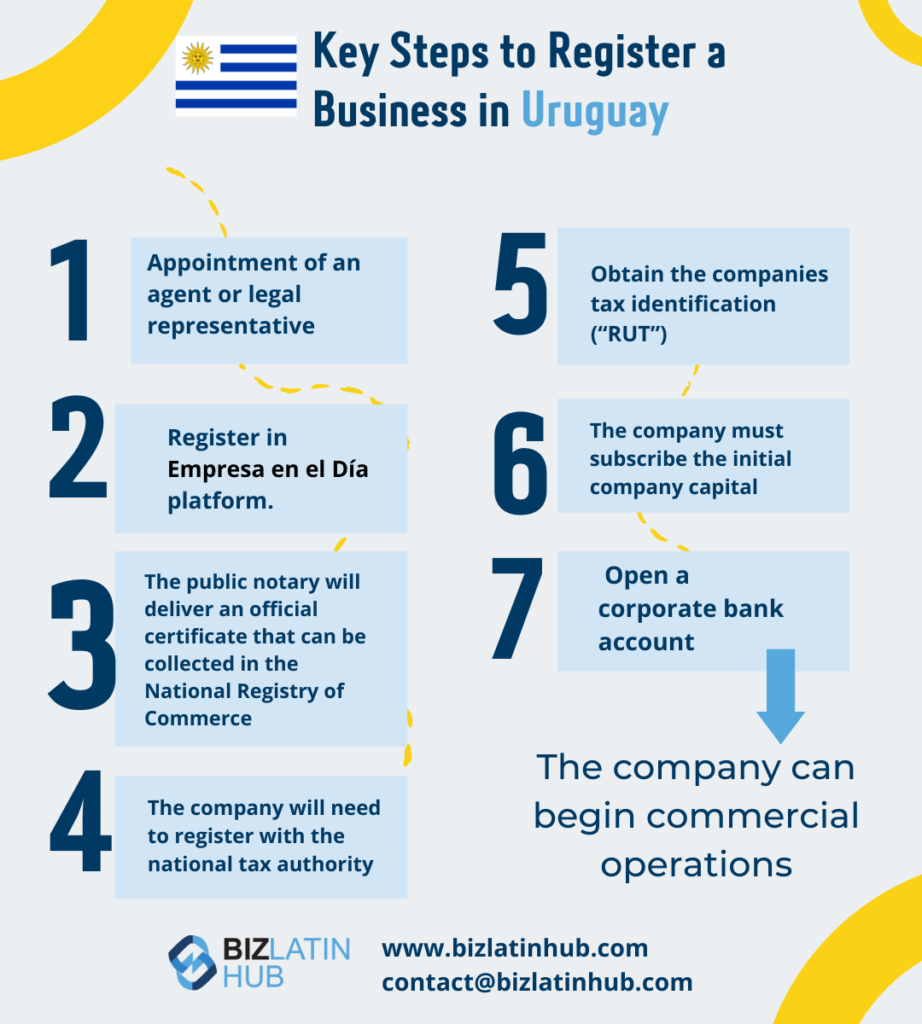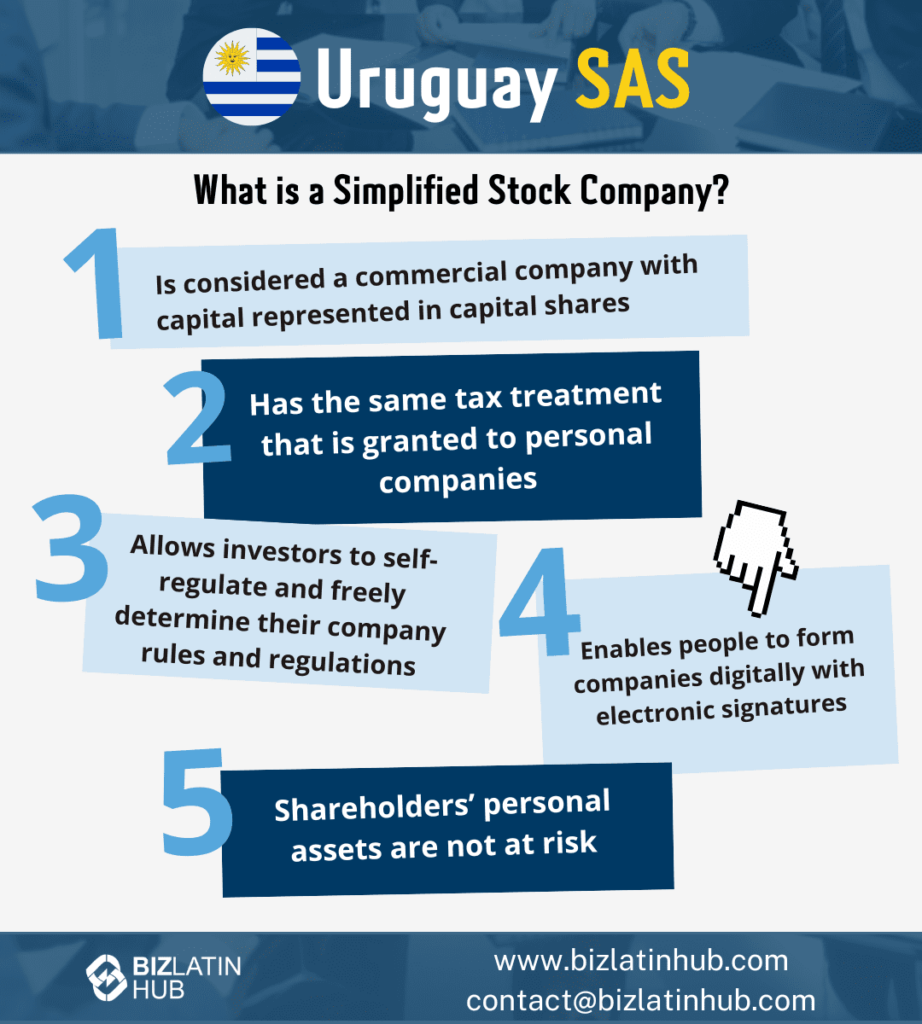For years, Uruguay has been full of exciting business opportunities. This year will be no different, as investors continue to shift their mindset towards Latin America.

In the past decade, Uruguay has had robust economic growth led by private consumption and exports, resulting in annual average GDP growth of 5.2%. Rising foreign investment from 2009 to 2013 led Uruguay to have the 2nd largest FDI/GDP ratio in South America in 2013.
Additionally, and particularly remarkable, the Uruguayan government has made efforts to position Uruguay as a gateway for trading between MERCOSUR economies.
The country has a favorable legal system, an investment climate that does not discriminate against foreign investors, and government sponsored initiatives that encourage innovation. For instance, the National Agency for Investigation and Innovation, a state-run organization, hosts conferences and events for the startup community all over Uruguay.
Knowing the requirements for business registration in Uruguay can give you an advantage over your competitors.
Table of Contents
How to Register a Business in Uruguay?
To be able to register a business in Uruguay, the following information is required:
- Resolution of the company to be established.
- The indication of your office address (‘domicilio fiscal‘) in Uruguay.
- Identification of the person/s who will administer or represent the company in Uruguay.
- The established company name.
- Information relating to the shareholders, including their names, marital status, nationality, etc.
Key Steps to Register a Business in Uruguay
- An agent or legal representative is appointed to carry out the business registration.
- The company starts the process on the ‘One-Stop Shop‘ (Empresa en el día) platform.
- The public notary will deliver an official certificate that can be collected in the National Registry of Commerce (Registro Nacional de Comercio).
- The company will need to register with the national tax authority and then obtain a tax identification number (“RUT”).
- The company must subscribe the initial company capital.
- Finally, the company must open a corporate bank account and deposit the required capital.
- The company can begin commercial operations.

Minimum Statutory Requirements in Uruguay
Like in all of Latin America, corporate entities in Uruguay must meet minimum statutory requirements to remain compliant and in good standing with local authorities. To register a company in Uruguay, these are some of the requirements you must meet:
- Legal Representative/Local Director: The company must have a Board of Directors or a Company Administrator, depending on the business type chosen by the client. The board directors don’t have to be Uruguayan nationals; foreign individuals, residents and non-residents may also be appointed.
- Fiscal/Legal Address: All companies in Uruguay must register a fiscal/legal address during the company incorporation process. This address must be domiciled in Uruguay and will be used for all official correspondence.
- Tax Declarations Requirements: Uruguayan corporations are required to prepare and present monthly and annual declarations to the national tax authority. It is highly recommended that a local expert manages these tax declarations in order to ensure that they are completed correctly. This same expert can also assist with company bookkeeping and financial reporting.

Uruguay Immigration
To obtain a permanent residency visa, it is necessary to gather and present the following documentation:
- Official document with which you entered the country: Any foreigner bearing temporary immigration status in the country may request to change their status to legal residency.
- Health card issued in Uruguay: This must be issued by the Health Department of Uruguay or by other authorized medical institutions. The health card must identify the individual’s purpose for applying for legal residency in Uruguay.
- Judicial Certificate: This should be issued by a government institution in the country the applicant lived for the past five years prior to entering Uruguay.
Professional Notes: All foreign documentation must be legalized by the Uruguayan Consulate in the country of origin and with the Uruguayan Ministry of Foreign Relations. Individual income must be presented on a monthly basis and the status of permanent resident will be lost if the resident is absent from the country for more than 3 years.
Visa Processing
- The process begins online on the website of the National Directorate of Migration (Dirección Nacional de Migración).
- On this platform, the individual must schedule an appointment and pay a visa processing fee as established by law.
- Then, the individual must go to the National Directorate of Civil Identification (Dirección Nacional de Identificación Civil) for the processing of the temporary Uruguayan identity card (Dirección Nacional de Identificación Civil).
- When the individual has been officially notified by mail that legal residency status has been obtained, he/she must register their birth certificate (Certificado de Nacimiento), which has to be apostilled in the Civil Registry (Registro Civil).
- Finally, the individual must go to the National Directorate of Civil Identification, to collect their Uruguayan identification card.
Common Questions When Forming a Company in Uruguay
Based on our extensive experience these are the common questions and doubts of our clients on company formation in Uruguay:
The challenges of doing business in Uruguay include a relatively small market size, bureaucratic processes, high taxation, and a complex labor market.
lt takes between 8 to 10 weeks to form a company in Uruguay after all required information and documentation have been provided.
Yes, foreigners can own a business in Uruguay.
It requires a minimum of two shareholders to form a company in Uruguay.
Do You Need Local Support for Your Business Registration Process in Uruguay?
If you are thinking about expanding your operations to Latin America, then Uruguay could be the right fit for your business. Uruguay, while often getting overlooked for its powerful neighbors (Argentina and Brazil), provides an attractive commercial environment for investors of all sizes.
The government has implemented policies to ensure Uruguay is an open-market economy, facilitating investment in the region for foreign individuals and companies.
It can be challenging to expand your business to a foreign country without a complete understanding of corporate compliance and statutory requirements. In this article, the key steps in the business registration process in Uruguay have been identified.
If you are ready to register a business in Uruguay and need additional information, then reach out to the experts at Biz Latin Hub. Get in contact with a member of our team today here at Biz Latin Hub and see how we support you and your business in Uruguay.

The information provided here within should not be construed as formal guidance or advice. Please consult a professional for your specific situation. Information provided is for informative purposes only and may not capture all pertinent laws, standards, and best practices. The regulatory landscape is continually evolving; information mentioned may be outdated and/or could undergo changes. The interpretations presented are not official. Some sections are based on the interpretations or views of relevant authorities, but we cannot ensure that these perspectives will be supported in all professional settings.